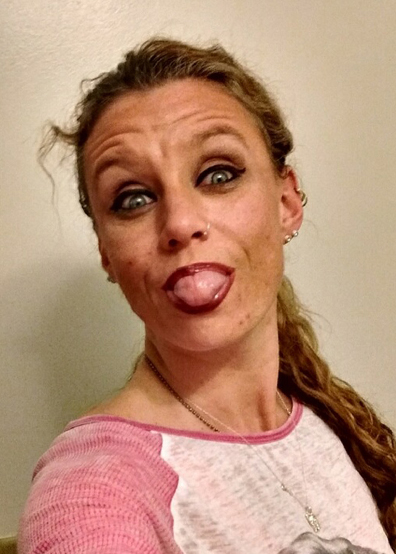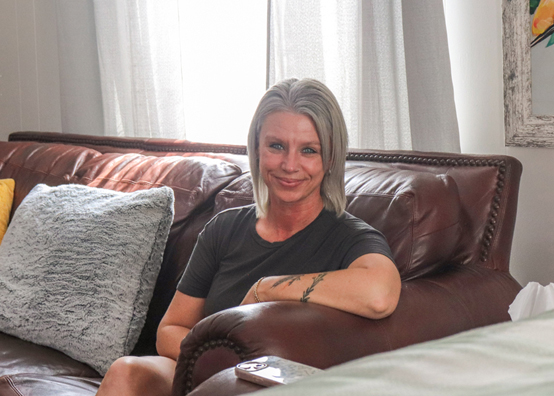By SYDNEY KENT
At 28 years old, Andrea Dimond believed she had found her passion.
She landed a job as a forensic technician assisting with autopsies at St. Joe Hospital, often with cases that involved a criminal element. Eager to continue in the field, Dimond enrolled in college to take criminal justice classes. She took on additional work as a jailer with multiple county jails. She met her now-husband, Jeff Dimond, and began happily raising her beautiful toddler, Ava, with him.

Everything was finally going exactly as Dimond had planned — until a temporary prescription for pain medication evolved into a full-fledged drug addiction. Though she had used various drugs and alcohol in the past, she had never been “chained” to a substance before that point.
“I started to like the way it felt,” Dimond recounted. “I felt like it gave me energy. It lasted a year and a half before my job figured it out. They took everything — my gun, my badge. I was done. I had lost everything in a day. And then Jeff came home. I had to tell him I had just lost all of my jobs, that I was highly addicted to narcotics, and that I didn’t know what to do with that.”
After losing her job, Dimond said her addiction took a turn for the worse. She felt as if she had lost her identity when her career ended.
“Eventually, I didn’t care anymore, and I started using a needle and shooting heroin,” Dimond said. “That continued for several years.”
Dimond said that at the worst of her addiction between 2013 and 2017, she and her husband struggled to find programs that were affordable or accessible. She attempted to quit multiple times on her own.

“I spent 13 hours one day after the onset of withdrawal just trying to push through,” Dimond said. “It was to the point I was convulsing in bed, I was a hot sick mess. There was nothing he could do to stop it for me.”
She continued to sink to the darkest depths of addiction — hearing blood-curdling screams, picking at her arms and legs until her skin was covered in bleeding patches, nearly overdosing from drugs in the bathroom while her family knocked on the door to check on her.

“I had an open DCS case at the time,” Dimond said. “They would drug test me, and they would tell Jeff that they didn’t know how I was alive with the amount of drugs that were in my system.”
In 2017, Dimond began selling her prescription pain medication to help fund her growing addiction. Soon after, she was arrested as part of a drug bust and charged with three Level 4 felonies for dealing narcotics.
“I cannot even begin to tell you how scared I was,” Dimond said. “I was sentenced to seven years in prison with purposeful incarceration, meaning that I could receive a sentence modification after I completed a substance abuse program while in prison, which is exactly what happened.”
Days before her sentencing hearing, Dimond learned that her mother had suffered a massive stroke. She ultimately passed away before Dimond’s release. Two months into incarceration, her now-husband, Jeff, broke up with her, cutting contact for nearly half of a year. Six months after being sentenced, Dimond’s brother was murdered at a party in Huntington.
“I went through a lot of loss,” Dimond recounted. “That’s what made me hit my knees and just cry out to the Lord. Like — Are you serious God? I feel like you’re just stripping me of everything and everyone I love. I believe he did strip me of everything so that all I could see was him.”
Dimond explained that she began to pray fervently over Jeff’s heart and life. Her prayers were answered during their time apart when she learned that he began to seek the Lord on a deeper level. Dimond said that they restored their relationship during an unexpected visit months later.
“I can’t talk about my testimony without talking about God,” Dimond smiled. “I had an encounter with him in the Huntington County Jail. I can’t put words to it, I just know I am different. It was me, the Bible, and concrete — and it radically changed me. It was the first time I was truly and genuinely sorry for everything I had done. I was repenting.”

Upon release from incarceration, Dimond completed a 14-month recovery program at The Remnant in Huntington. She came home and began rebuilding the trust that had been broken with Ava.
“I don’t just say ‘Please, forgive me,’ — I go through the list,” Dimond emphasized. “Please forgive me for taking you with me to the hood in Fort Wayne while I got the drugs I thought I needed. Please forgive me for not being there. Please forgive me for finding needles in my purse when you just wanted lipstick.”

The year after she returned home, Dimond finished the five classes she needed to earn a bachelor’s degree in criminal justice.
Hoping to work in law enforcement again, Dimond met with the same prosecutor assigned to her case. She asked if it was even possible to continue the career path due to her felony. She was pleasantly surprised to learn that she could.
“He said to me that he has never seen someone he’s prosecuted come back and ask to be a probation officer,” Dimond laughed. “He loved my story, but also told me I would be doing a disservice to God if I got back into criminal justice work because I would not be able to talk about God in the way that I wanted.”
She was defeated. Dimond poured out her heart to Jeff and Jesus and prayed over what to do next. Two days later, she received a text from Christine Walker, the Executive Director of Community Care. The text was an invitation to interview for a job.
Dimond accepted the position of operations manager at Grace and Mercy Transitional House following the interview, later moving to direct the organization’s newest chapter — Hannah’s House.
Dimond, Jeff, and their now 17-year-old daughter, Ava, each visit area churches, events, and groups to share their perspectives — both from the lens of addiction and loving an addict. Dimond said that through faith, healing and restoration have taken place.
“It has been a beautiful journey,” Dimond concluded. “I know a lot of people don’t really understand that. But — I wouldn’t take any of it back. It made me who I am today. The darkness that I had to walk through, God shined his light through it.
Aug. 31 is International Overdose Awareness Day. It is a global event to raise awareness of overdoses, reduce the stigma of drug-related deaths, and acknowledge the grief felt by families and friends.
If you or someone you love is struggling with addiction, help is available. Call the Substance Abuse and Mental Health Service Administration, or SAMHSA, national helpline at 1-800-662-HELP (4357).
Visit samhsa.gov to learn how to recognize the signs of an overdose.
Narcan, also known as Naloxone, is a medicine that rapidly reverses an opioid overdose. Narcan is available in Bluffton at the back of the Community Thrift store, located at 117 South Main Street.
sydney@news-banner.com



